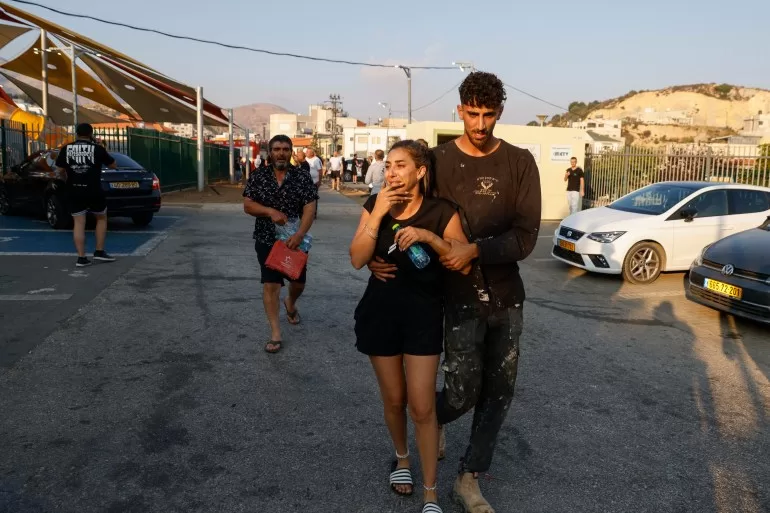At least 11 people have been killed and 19 others wounded in a rocket attack on a football pitch in the town of the Majdal Shams in the Israeli-occupied Golan Heights, Israeli authorities said.
Israel’s military spokesman Daniel Hagari said children were among those killed and accused the Lebanese group Hezbollah of carrying out the attack on Saturday, but the group denied any involvement.
“Our intelligence is clear. Hezbollah is responsible for the killing of innocent children,” Hagari said.
“We will prepare for a response against Hezbollah … we will act,” he said.
Hezbollah swiftly denied responsibility for the attack on Saturday. The group said in a statement it “categorically denies the allegations reported by certain enemy media and various media platforms concerning the targeting of Majdal Shams”.
“The Islamic Resistance has no connection to this incident,” it said, referring to its military wing.
The Iran-aligned group has been exchanging fire with Israeli forces in areas near the Israel-Lebanon border since October 8, when Israel launched its war on Gaza.

The cross-border attacks, which Hezbollah said it launched in solidarity with the Palestinian people amid Israel’s war on Gaza, have led to fears of a larger regional conflagration.
Israel’s Prime Minister Benjamin Netanyahu’s office said he would fly home early from his trip to the United States, where he met several senior US officials.
“Immediately upon learning of the disaster in Majdal Shams, Prime Minister Benjamin Netanyahu directed that his return to Israel be brought forward as quickly as possible,” Netanyahu’s office said in a post on X.
Netanyahu also told the leader of the Druze community in Israel, “Hezbollah will pay a heavy price, the kind it has thus far not paid,” during a phone call, according to a statement from his office.
A spokesperson for the White House National Security Council condemned the rocket attack, stating, “Our support for Israel’s security is iron-clad and unwavering against all Iranian-backed terrorist groups, including Lebanese Hezbollah,”.
Lebanon’s government, in a statement, urged the “immediate cessation of hostilities on all fronts” and condemned attacks on civilians.
Fears of escalation
Reporting from Qatar, Al Jazeera’s Hamdah Salhut said Saturday’s attack was one of the deadliest single incidents since the cross-border fire began and comes amid growing fears of an escalation.
“Hezbollah is saying this isn’t from them, whereas the Israelis immediately said it was them,” she said, adding that neither side wants an all-out war, “but both sides have said they are prepared for it.”
Gideon Levy, a columnist for the Israeli newspaper Haaretz warned that “now things can really get out of control”.
“It’s a dramatic moment. We don’t know what will be next. There is a lot of uncertainty. The coming hours will be decisive,” he told Al Jazeera.
“I don’t see Israel ignoring this incident.”
Political analyst Ori Goldberg said he believed it was unlikely the attack would lead to an “all-out war” between Israel and Hezbollah.
“Both sides don’t want an all-out war, this has been made abundantly clear”, he told Al Jazeera, and noted that the attack took place on Israel’s periphery, rather than in its heartland. “I don’t think that this will be enough to take us to an all-out war,” he said.
The attack on the football pitch followed an Israeli attack in Lebanon that killed four fighters on Saturday.
Two security sources in Lebanon said the four fighters killed in the Israeli attack on Kfar Kila in southern Lebanon were members of different armed groups, with at least one of them belonging to Hezbollah.
The Israeli military said its aircraft had targeted a military structure belonging to Hezbollah after identifying fighters entering the building.
Hezbollah claimed it carried out at least four attacks, including with Katyusha rockets, in retaliation for the Kfar Kila attacks.
The Golan Heights, a 1,200sq-kilometre (463sq-mile) plateau, is Syrian territory that Israel occupied in 1967 after the Six-Day War, before annexing it in 1981, a move the United Nations Security Council unanimously condemned.
Many residents in the territory are Syrian Druze, some of whom have Israeli citizenship.

